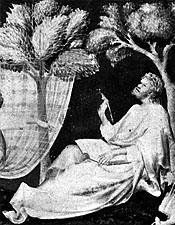The Eclogues
, translated by Kline, A.S., (contact-email)
Virgil’s Eclogues, also known as the Bucolics, is his earliest major work, comprising ten pastoral poems. Adapting Greek bucolic traditions, specifically those of Theocritus, Virgil imbued his Roman rendition with both political and mythical narratives. Set during Rome’s chaotic period of around 44 to 38 BC, these poems diverge from Theocritus by incorporating political unrest. The text features herdsmen engaging in dialogues and competitive singing within pastoral scenes, reflecting both resistance and adaptation to societal changes and varied romantic experiences. Successful on stage, Virgil’s blend of politics and love established his fame. The Eclogues employ dactylic hexameter, maintaining Virgil’s consistent poetic style.

Kline, A.S.,
Support Open-Access:
Your contribution keeps our classical translations available to all. Every dollar helps support classics education and funds the expansion of our catalogue. Value what we do? Donate now.
File Downloads:
© Copyright, All Rights Reserved. This work may be freely reproduced, stored and transmitted, electronically or otherwise, for any non-commercial purpose. Conditions and Exceptions apply.